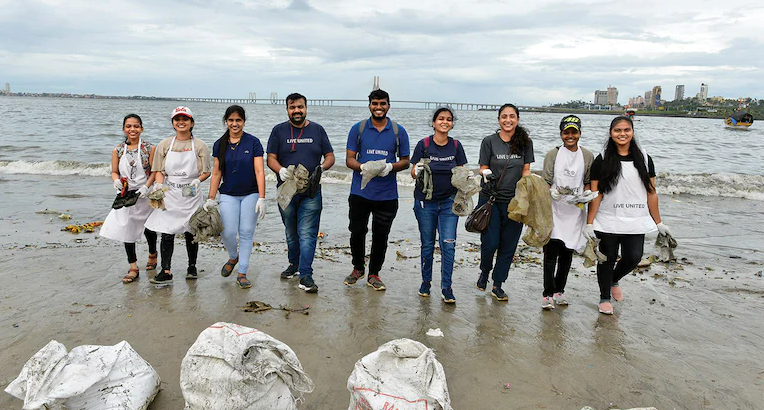This Mumbai NGO is working towards refining beaches; Know how-
This Mumbai NGO is working towards refining beaches; Know how-

In 2017, UWM started cleaning Mumbai’s beaches, and encouraging people to take ownership of public spaces - like the 16 km of accessible beaches here. The NGO is a part of the 130-year-old global organisation United Way World. It has engaged 11,000 volunteers in shore cleaning efforts till now, and has educated 9,000 people about Mumbai’s rich marine life. It cleared 343,000 kg of waste from Mumbai’s beaches; sent 98,000 kg to recycling centres!
UWM has adopted 9 beaches in Mumbai - between Dadar and Malad. I appointed 3 paid workers- that it describes as safai saathis, and one supervisor at each of the beaches. Among their other responsibilities, they wash the non-biodegradable waste collected on the beach, mainly plastic, before segregating it for collection, so that sand is not carried away with the waste.
“Being a coastal city, it is a challenge for the municipal corporation to keep Mumbai’s shores clean,” says Ajay Govale - who is vice president at UWM. Govale oversees shore cleaning works, saying the biggest challenge is the never-ending state of incoming waste. Every high tide brings a lot of waste to the shore, resulting in undisciplined waste management practices. Most of the waste is dumped into the sea from drains / rivers. If that is stopped at the source, half the waste on the shores will disappear.
UWM has launched many initiatives to sensitise people regarding value of beaches and the importance of keeping them clean. They paint walls around shores and install appeal boards, amongst many other things. It also gave out dustbins to snacks stall owners at Dadar Chowpatty beach, appealing them to encourage customers not to throw garbage on the shore.
The sense of ownership in people is missing. People look at beaches only as a place for recreation, and leave them to their fate after they have had their fun, says Govale. They fail to see the ecological value of the beaches.
In 2020, UWM conducted a survey to identify the flora and fauna at Chimbai, which is Mumbai’s most neglected beach, getting help of many marine experts. They found around 115 of mesmerising species – which is almost twice as many as at other beaches. A living octopus was also found here. UWM has also created a ‘marine field guide’ - aiding visitors learn more about specific beaches.
UWM’s other projects are a shore-walk initiative, educating visitors about marine life. For this, it also conducts classroom sessions for students, along with for corporate / government employees to educate them about the existing marine life at specific beaches.
